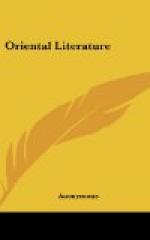I use the word refreshing, because some of the imagery of these lyrics is new to me, and quite unparalleled in European literature. What can be more novel, and at the same time more charming than the following simile, with which a short elegy concludes:—
“But though in dust thy relics lie,
Thy virtues, Mano, ne’er shall die;
Though Nile’s full stream be seen
no more,
That spread his waves from shore to shore,
Still in the verdure of the plain
His vivifying smiles remain.”
The praise of a humble lot has been sung from Hafiz to Horace, but never illustrated by a prettier conceit than the Arabic poet has recourse to in this stanza:—
“Not always wealth, not always force
A splendid destiny commands;
The lordly vulture gnaws the corse
That rots upon yon barren
sands.
“Nor want nor weakness still conspires
To bind us to a sordid state;
The fly that with a touch expires,
Sips honey from the royal
plate.”
This is undoubtedly a very original way of stating the philosophic axiom of the Augustan poet,
“The lord of boundless revenues,
Do not salute as happy.”
I have spoken of the wit of these verses, which is certainly one of their distinguishing qualities. It is quite Attic in its flavor and exquisitely delicate in its combined good-humor and freedom from rancor. An epigram, according to the old definition, should be like a bee; it should carry the sweetness of honey, although it bears a sting at the end. Sometimes the end has a point which does not sting, as in the following quatrain of an Arabic poet:—
“When I sent you my melons, you
cried out with scorn,
They ought to be heavy and
wrinkled and yellow;
When I offered myself, whom those graces
adorn,
You flouted, and called me
an ugly old fellow.”
Martial himself could not have excelled the wit of an epigram addressed to a very little man who wore a very big beard, which thus concludes:—
“Surely thou cherishest thy beard
In hope to hide thyself behind it.”
To study a literature like that of the Arabians, even partially and in a translation, is one of those experiences which enlarge and stimulate the mind and expand its range of impressions with a distinctly elevating and liberalizing effect. It has the result of genuine education, in that it increases our capacity for sympathy for other peoples, making us better acquainted with the language in which they reveal that common human heart which they share with us.
E.W.
AN ELEGY[1]
Those dear abodes which once contain’d
the fair,
Amidst Mitata’s wilds
I seek in vain,
Nor towers, nor tents, nor cottages are
there,
But scatter’d ruins
and a silent plain.
The proud canals that once Rayana grac’d,
Their course neglected and
their waters gone,
Among the level’d sands are dimly
trac’d,
Like moss-grown letters on
a mouldering stone.




